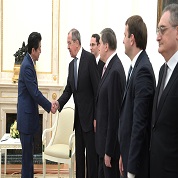Putin and Abe agree to continue their search for compromise on a peace treaty

Russian President Vladimir Putin and Japanese Prime Minister Shinzo Abe have entrusted their foreign affairs Ministries to continue the search for ways to sign an acceptable peace treaty and the ongoing dialog to further deepen cooperation between the countries. This is was the outcome of the bilateral talks, held by both leaders on January 22, in the Kremlin, which failed to bridge the two countries’ increasingly diametrically divergent positions on the peace treaty issue.
Speaking at the post-summit press conference in central Moscow, Putin and Abe confirmed that the basis of the ongoing peace treaty talks is the Joint Soviet-Japanese Declaration of 1956, which primarily envisages the signing of a peace treaty between Moscow and Tokyo. “More painstaking tasks lie ahead as both parties seek to find a solution that is equally acceptable to the citizens of both countries,” the leaders noted.
Putin and Abe also discussed the ways and means to further develop their countries’ robust bilateral trade and economic ties. The gross trade turnover between the two countries from January to November 2018 totaled almost USD 20bn, Putin continued, describing this figure as unsatisfactory and non-reflective of the huge economic potentials of both countries. “One could have set a goal to increase the trade turnover by 1.5x to at least USD 30bn,” Putin noted.
Supporting Putin’s call for further depending the current level of trade and economic ties between Russia and Japan, Abe expressed his readiness to boost the scope of cooperation, stressing that Japan is already implementing several investment projects in Russia, a part of the ongoing cooperation in eight economic spheres that were proposed by Tokyo in 2016.











 Web design,
Web design,